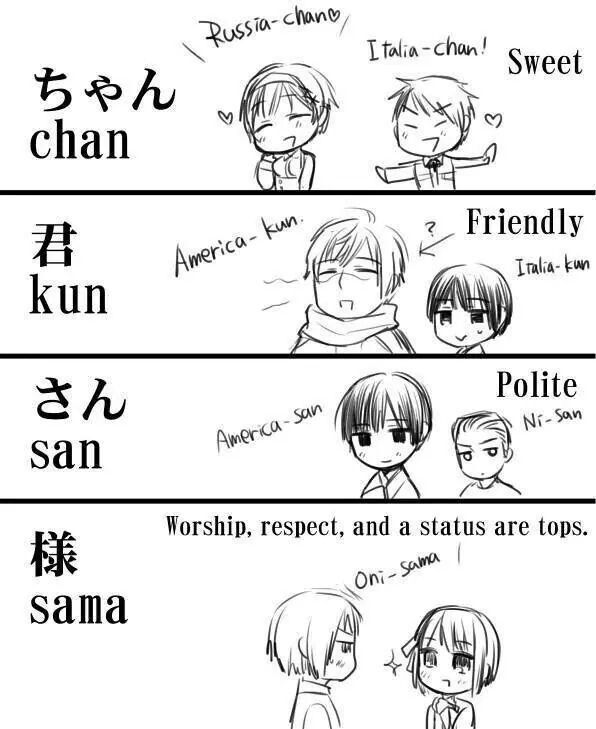Learn Japanese With Go Go Nihon
And there you have it! The basic rules of using Japanese honorifics. Their usage is much more complex and can be difficult to interpret at times. But as a foreigner, people will cut you some slack if you mess up. That being said, if you work in Japan, you may want to be extra careful when using these honorifics. Dont hesitate to ask the person directly what they want you to call them if youre not sure.
If you want to learn more about the Japanese language, why not consider studying Japanese in Japan? Or if you cant make it to Japan yet, an online course is one of the best ways to start your Japanese language journey. Go! Go! Nihon offers a comprehensive beginner Japanese course together with Akamonkai Japanese Language School. Read more about the course here.
If you want to study in Japan but youre short on time, Go! Go! Nihon also offers amazing study trips where you can learn Japanese and enjoy Japanese culture for a few weeks. We also offer a 2-week crash course for beginners, where you learn essential everyday Japanese phrases.
Contact us for more information and make sure to follow our blog for more insight into the Japanese language, culture and society.
Study Japanese with Go! Go! Nihon selected textbooks
May 1 Word Of The Day
Can a senpai be younger than you? What does the name yuri mean’? San, sama, kun, and chan in japan, you just simply do not call people by their names. Kun is not only used to address females formally anime culture monday anime suffixes: After reading this post your japanese will sound more natural as you will learn how to use japanese honorifics! ~kun a term of respect that is most commonly used to address young males. ‘baby steps to giant strides’ subo vídeos de siglo en siglo. This could be the only web page dedicated to explaining the meaning of anime . Pada kenyataannya, sei adalah siswa paling populer di kampus. Find out more with myanimelist, the world’s most active online anime and manga community and database. What is josei in anime’ what does the name yuki mean? Just sit back and relax!
‘baby steps to giant strides’ subo vídeos de siglo en siglo. It is primarily a male honorific, but not always. I am sure you have wondered about the meaning of these japanese suffixes. What is josei in anime’ what does the name yuki mean? Guys will refer to men.
When & How To Use Kun In Japanese
The honorific title kun is used in informal, formal, and business situations. Together with the polite honorific san and the feminine honorific chan it is one of the most common suffixes used in everyday life in Japan and anime. So when and how to use kun in Japanese?
Kun can be added after someones first or last name and should only be used with close friends or ones juniors. In informal situations, it is more commonly used for boys and with their first name. At work, it can be used for younger employees in general and both given names or surnames.
Lets look at some concrete examples of when and how kun is used in more casual and more formal situations.
Don’t Miss: Where To Watch Anime On Tv
What Are Popular Shota In Anime And Manga
According to Honeys Anime, there are many popular shota characters in anime and manga. These include Mitsukuni Honey Haninozuka from Ouran High School Host Club, Hiro Sohma from Fruits Basket, Naozumi Kamura from Kodocha, Alladin from Magi: The Labyrinth of Magic, Mirumo from Mirmo Zibang!, Shino Inuzuka from Hakkenden: Eights Dogs of the East, Ruka Nogi from Alice Academy, Shaoran Li from Cardcaptor Sakura, Ciel Phantomhive from Black Butler, and Ren Kaidou from Super Lovers. There are many more popular shota characters where this came form, but if you are interested in watching anime that feature shota characters, this list is a great place to start.
Titles For Royalty And Others

- Heika is affixed to the end of a royal title, witha meaning similar to “Majesty”. For example, Tenn heika means “His Majesty, the Emperor” and Jo heika means “Her Majesty, the Queen”. Heika by itself can also be usedas a direct term of address, similar to “Your Majesty”.
- Denka is affixed to the end of a royal title, witha meaning similar to “Royal Highness” or “Majesty”. For exampleSuwden koku Bikutoria Ktaishi denka “Her Royal Highness Crown Princess Victoria of theKingdom of Sweden”.
- Kakka means “Your Excellency” and is used forambassadors and some heads of state.
Don’t Miss: All Speed And Agility Training Areas In Anime Fighting Simulator
Kun Vs San Whats The Difference
The difference between kun and san is pretty straight forward. They are both suffixes used after names, but san is the politer and more respectful honorific compared with kun.
While you use kun with close friends and younger employees, san is used with people you dont know very well like strangers or acquaintances.
Thats why you also should use san when addressing superiors and your seniors at work or at school. But you use kun when talking to close friends or family members.
Whenever you are unsure it is better to use san. It is also the common honorific used when talking to older people.
Whats The Difference Between San Chan And Kun
San , chan , and kun are honorific suffixes that are added to a persons name to address them respectfully. San is the politest and is used for strangers, older people, and ones superiors. Chan and kun are more casual and are therefore used with younger people or among friends.
Furthermore, the rather feminine or cute suffix chan is more commonly used with babies and toddlers regardless of their gender, as well as girls and women. The slightly more masculine suffix kun , on the other hand, is primarily used with boys and younger men.
As a general rule San is used with people you have just met and you dont know very well, while chan and kun are used with good friends and people you know well. If you are unsure it is always better to use the more polite honorific title san.
You can read all about the other two suffixes and when to use them in my blogposts What Does San Mean in Japanese? and What Does Kun Mean in Japanese?.
Read Also: Attack On Titan Buzzfeed Quiz
What Does Senpai & Kohai Mean In Japanese
Senpai refers to a person, not necessarily older, but a person who has more experience in a specific domain. Although it is mostly used to refer to a senior at school it can be used to address seniors at the workplace or in a sports club. The people who were there before you are your Senpais even if they are younger.
Well, you guessed it, Kohai is the opposite of Senpai. It refers to the juniors.
What Does Kun Mean What Does Chan Mean
Japanese honorifics confuse us Westerners. The closest matches we have are Mr., Miss., and other addresses. Unlike Englishs polite addresses, Japanese honorifics denote social standing and relationship between the speaker and the listener. They dont remain constant. I am always Mr. Kincaid in formal Western affairs for example. But in Japan I could be Kincaid-kun, Kincaid-san, or Kincaid-sensei depending on social context. Like Western salutations, Japanese honorifics can be used sarcastically or arrogantly. Ore-sama, for example, roughly translates to my magnificent self.
Dropping an honorific is a sign of a close relationship and seen as insulting if you dont have permission. You see anime characters make a fuss about this and the use of their first name whenever this happens without their consent. The rule of thumb: when in doubt about honorifics, ask.
In anime you see kun and chan tossed around as much as the honorific senpai. The other common honorific san is used when just being polite. In most translations Ive read, this honorific is dropped. Calling someone by their surname is considered a sign of respect or fondness here in the West , so keeping with the Japanese practice of last-name first automatically confers polite respect in Western translations. Calling Hideki Tanashi by his last name Tanashi means we dont need to attach the san to it. In fact, using honorifics too much in English translations can be off-putting for people.
Don’t Miss: How To Draw Anime On Computer With Mouse
What Do Chan San And Kun Mean In Japanese
Respect is one of the most cherished values of Japanese culture. And the Nipponjin express their respect to one another through Honorifics. Honorifics are representative of your status in society thus different suffixes are used in specific situations.
Informal suffixes are most of the time used to address people with the same social status as yourself and the opposite is true for Formal suffixes. It is very important to distinguish the difference between both to go through a conversation without offending the other party.
So lets talk about the meaning and proper use of Chan, San, and Kun, since you are sure to come across one of them in most conversations.
Get The Kun Neck Gaiter And Mug
Kun can mean different things depending on the gender. What’s the actual meaning of sama and kun? Find out more with myanimelist, the world’s most active online anime and manga community and database. Sama is a way of showing a higher position you can use this when writing a letter. After reading this post your japanese will sound more natural as you will learn how to use japanese honorifics! Today we unpack common japanese honorific’s in anime. You’ll see female anime characters use it to refer to guys as a signal of endearment or familiarity. This means we have some letters forming a root word and then we can add some stems that act as branches to form a sentence. May 1 word of the day. In business settings junior women may also be addressed as kun by superiors. This means we have some letters forming a root word and then we can add some stems that act as branches to form a sentence. It can also be used for a very close friend or family. I am sure you have wondered about the meaning of these japanese suffixes.
A japanese suffix added to a name . Character art character design references character design character design male rpg character art fantasy warrior. The princess of snow and blood. Pada kenyataannya, sei adalah siswa paling populer di kampus. It is primarily a male honorific, but not always.
Don’t Miss: How To Draw Jawline Anime
What Does The Word Senpai Mean
According to Merriam-Webster, Dictionary, and Japan Powered, the word senpai is a Japanese word that refers to an upperclassman who takes on the role of mentor, senior, or elder for an underclassman, or kohai. The senpai-kohai system is most often used in English in reference to anime and manga dynamics between characters. This is one of many honorifics that a person in Japanese society can take on. Senpai is sometimes spelled as sempai.
This term is similar to the Japanese sensei, which is a teacher or instructor, usually in Japanese martial arts. Sensei has been used in English since 1968, and is more along the lines of the words master and teacher. Senpai is a slightly lower rank than someone who is sensei. Below senpai is khai , who is a junior or protege. This Japanese honorific can be used attached to someones name or surname, much like -san, -chan, -sama, or -kun, and shows a reverence for the person. Employees would be considered kohai and their boss would be considered senpai, for example, or a tutor would be senpai and a student would be considered the social status of kouhai. Usually. One can assume that superiors, someone in a higher grade, an eldest son or a senior employee are senpai, while a lower person would be considered kohai. This is a part of the civil code of Neo-confucianism in Japanese history and is a reflection of the social hierarchy and traditional family system present in daily life.
Used As Part Of Other Words

Since this word can be used for things that are seen as cute, youll often hear it added onto other words.
But the thing you have to keep in mind is that these words require that be a part of them. Its not like names where you could use or instead.
For example, the Japanese word for dog is . But the sound that dogs make when they bark in Japanese in . Because of this, it is common to call dogs or puppies in Japanese.
Another word that you see used on is one of the Japanese words for baby. There are quite a few Japanese words for baby, but this one is by far the most common.
In this case the word is which adds onto the Japanese word which means red.
I assume this is because babies are reddish when theyre born? Thats what Im going with, but I dont have facts to back that up.
The last word that Ill talk about here is which is an interesting word because its exclusively used for boys. The nuance that you have to understand is that its only used for young boys who are innocent or ignorant of the ways of the world.
Perhaps a young rich lad who has been pampered his whole life and doesnt know what the real world has in store for him.
You May Like: How To Draw Anime Female Anatomy
For Criminals And The Accused
Convicted and suspected criminals were once referred to without any title, but now an effort is made to distinguish between suspects , defendants , and convicts , so as not to presume guilt before anything has been proven. These titles can be used by themselves or attached to names.
However, although “suspect” and “defendant” began as neutral descriptions, they have become derogatory over time. When actor and musician Gor Inagaki was arrested for a traffic accident in 2001, some media referred to him with the newly made title menb , originating from the English word “member”, to avoid use of ygisha . But in addition to being criticized as an unnatural term, this title also became derogatory almost instantlyan example of euphemism treadmill.
Criminals who are sentenced to death for the serious crimes such as murder, treason, etc. are referred to as shikeish .
Using Chan For Cute Animals Things & Objects
Since chan adds a lot of cuteness and fondness to whats been mentioned, it is also often used with pets, cute animals, beloved food items, and other precious objects and things. In other words, you can use it with all the things that you or other people consider kawaii .
Cute animals such as cats and pandas are often called Neko-chan and Panda-chan . The same goes for other common pets such as dogs and rabbits, too.
Japanese names for pets often include the suffix chan , too. If not it is usually added. My friends dog is called Koko-chan. My students introduced their pets as Momo-chan, , and Gobo-chan.
When using chan with foods or other things it usually sounds a little bit childish. So if used in this way it is mostly done by young children or women who want to sound kawaii or cutesy. So I dont recommend doing this unless you want to come across as girlish and sweet.
By the way, I forgot to mention that some Japanese words already include the honorific suffix chan. The word baby, for example, is Aka-chan . Another example is Bocchan which is used to refer to someones son in a respectful way.
Also Check: How Much Do Japanese Voice Actors Make
What Is The Difference Between San Sama Kun And Chan
In Japan, when talking about other people, one uses honorific titlesafter their name. The most common title is san . It meansall of “Mr”, “Mrs”, “Miss”, and “Ms.” Mr Tanaka is referred to asTanaka-san, as is Mrs Tanaka, and their unmarried daughter. Othercommon titles include sama , a more polite version ofsan, sensei , for teachers, kun andchan. These titles also come after the name.
Correct use of titles is very important in Japan. Calling somebody byjust their name, without adding a title, is a form of bad manners,called yobisute .
Although titles are usually added to people’s names, there are someexceptions. They are not used when talking about a family member, oranother member of one’s “in-group”, to someone from outside thegroup. At work, Ms. Shimizu calls her boss “Tanaka san” when she talksto him, or about him to other people. But when she talks to a customerfrom outside their company, she calls him just “Tanaka”.
Using Kun In Formal & Business Situations
At work or in a more formal setting kun is used by someone with a higher position towards younger employees or people with a lower status. A superior, senior coworker might use kun. Teachers, too, however usually only for male students.
While in everyday life kun expresses close friendship, in the office or formal situations it rather indicates hierarchy and the addressees lower position.
However, when a superior or coworker uses kun instead of chan with a female employee it actually expresses respect. Since it sounds less cute and childlike and therefore more professional.
I assume that in business situations, kun is also more often used with an employees given name than their surname, but honestly, I am not sure. In general either way should be fine.
Also, please keep in mind that while using kun might seem a bit rude, it is actually more polite than just calling someone by their name. No matter if you call them by their first or last name.
Kun is also used in the National Diet. Usually, the chairperson attaches kun when addressing Diet members and ministers.
Recommended Reading: Spongebob Renai Circulation


